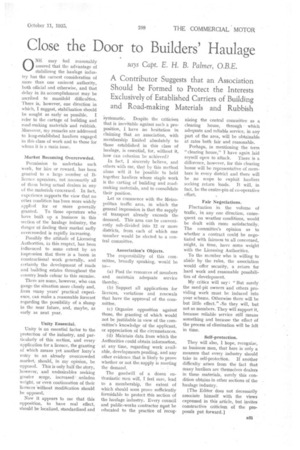Close the Door to Builders' Haulage
Page 45

If you've noticed an error in this article please click here to report it so we can fix it.
says Capt. E. H. B. Palmer, O.B.E.
A Contributor Suggests that an Association Should be Formed to Protect the Interests Exclusively of Established Carriers of Building and Road-making Materials and Rubbish
0 NE may feel reasonably assured that the advantage of stabilizing the haulage industry has the earnest consideration of more than one eminent authority, both official and otherwise, and that delay in its accomplishment may be ascribed to manifold difficulties. There is, however, one direction in which, I suggest, stabilization should be sought as early as possible. I refer to the cartage of building and road-making materials and rubbish. Moreover, my remarks are addressed to long-established hauliers engaged in this class of work and to those for whom it is a main issue.
Market Becoming Overcrowded.
Permission to undertake such work, for hire or reward, has been granted to a large number of Blicence operators, not necessarily all of them being actual dealers in any of the materials concerned. In fact, experience supports the view that no other condition has been more widely applied for or more generally granted. To those operators who have built up a business in this section of the haulage industry, the danger of finding their market sadly overcrowded is rapidly increasing.
Possibly the attitude of Licensing Authorities, in this resptct, has been influenced to some extent by an impression that there is a boom in constructional work generally, and certainly the development of roads and building estates throughout the country lends colour to this surmise.
There are some, however, who can gauge the situation more closely and, from many years' practical experience, can make a reasonable forecast regarding the possibility of a slump in the near future, and, maybe, as early as next year.
Unity Essential.
Unity is an essential factor to the protection of the industry, and particularly of this section, and every application for a licence, the granting of which means yet another lorry's entry to an already overcrowded market, should,. in my opinion, be opposed. This is only half the story, however, and undesirables seeking greater scope, increased unladen weight, or even continuation of their licences 'without modification should be opposed.
Now it appears to me that this opposition, to have real effect, should be localized, standardized and
-systematic. Despite the criticism
that is inevitable against such a proposition. I have no hesitation in claiming that an association, with membership limited absolutely to those established in this class of haulage, is essential, for, without it, how can cohesion be achieved?
In fact, I sincerely believe, and others with me, that by this method alone will it be Possible to hold together hauliers whose staple work is the carting of building and roadmaking materials, and to consolidate their position.
Let us commence with the Metropolitan traffic area, in which the general impression is that the supply of transport already exceeds the demand. This area can be conveniently sub-divided into 12 or more districts, from each of which one member would be elected to a central committee.
Association's Objects.
The responsibility of this committee, broadly speaking, would be to—
(a) Pool the resources of members and maintain adequate service thereby.
(b) Support all applications for licences, variations and renewals that have the approval of the committee.
(c) Organize opposition against those, the granting of which would not be justifiable in view of the committee's knowledge of the applicant, or appreciation of the circumstances.
(d) Maintain data from which the Authorities could obtain information, at any time, regarding work available, developments pending, and any other evidence that is likely to prove whether or not the supply is meeting the demand.
The goodwill of a dozen enthusiastic men will, [feel sure, lead to a membership, the extent of which should soon prove sufficiently formidable to protect this section of the haulage industry. Every council and public-works contractor miust be educated to the practice of recog
nizing the central committee as a clearing house, through • which adequate and reliable service, in any part of the area, will be obtainable at rates both fair and reasonable.
Perhaps, in mentioning the term "clearing house," I have again laid myself open to attack. There is a difference, however, for this clearing house will be representative of members in every district and there will be no scope to exploit hauliers
seeking return loads. It will, in fact, be the centre-pin of co-operative effort.
Fair Negotiations.
Fluctuation in the volume of traffic, in any one direction, consequent on weather conditions, would be dealt with more satisfactorily. The committee's opinion as to whether a contract could be negotiated with fairness to all concerned, might, in time, have some weight with the Licensing Authorities.
To the member who is willing to abide by the rules, the association would offer security, a return for hard work and reasonable possibilities of development.
My critics will say : " But surely the sand-pit owners and others providing work must be induced into your scheme. Otherwise there will be but little effect." .So they will, but not as members. They will support it, because reliable service still means something and because the effect of the process of elimination will be felt in time.
Self-protection. They will also, I hope, recognize, as business men, that here is only a measure that every industry should
take in self-protection. If another difficulty arises from the fact that many hauliers are themselves dealers in these materials, surely this condition obtains in other sections of the . haulage industry.
[The Editor does not necessarily associate himself with the views expressed in this article, but invites constructive criticism of the proposals put forward.]




























































































